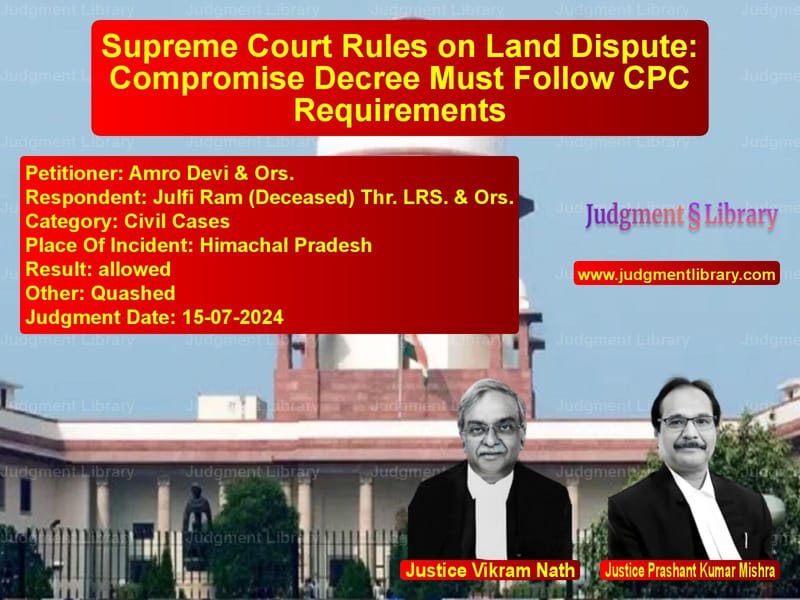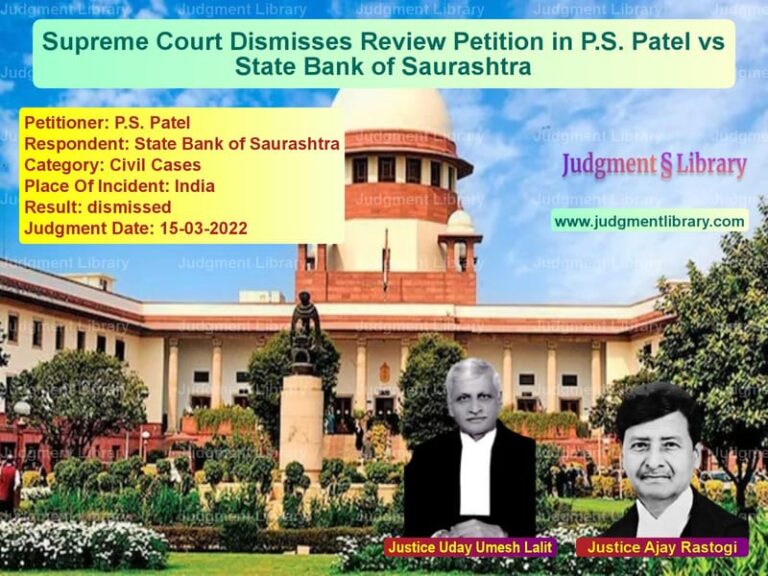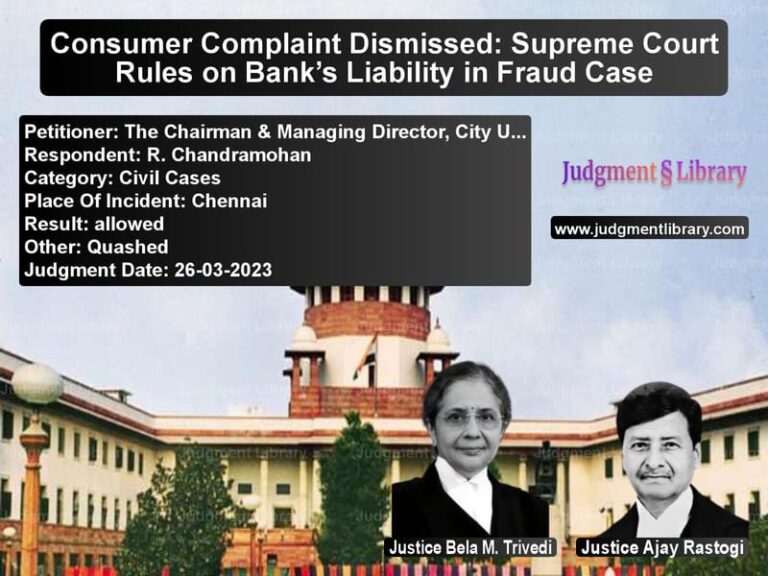Supreme Court Rules on Land Dispute: Compromise Decree Must Follow CPC Requirements
The Supreme Court of India has delivered a significant ruling in the case of Amro Devi & Ors. v. Julfi Ram (Deceased) Thr. LRS. & Ors., addressing the validity of compromise decrees in property disputes. The case revolved around the applicability of Order XXIII Rule 3 of the Code of Civil Procedure (CPC) and whether an oral compromise recorded in court could be considered legally binding.
Background of the Case
The dispute dates back to 1979 when a group of plaintiffs, led by Mansha Ram and others, filed a suit for declaration and permanent injunction against Julfi Ram and others, asserting ownership over a piece of land measuring 7 kanals 9 marlas. The defendants contended that they were tenants and should be recognized as owners.
The Trial Court ruled in favor of the plaintiffs, granting them ownership and restraining the defendants from interfering with the land. However, the matter took a turn in 1983 when Mansha Ram and others executed a sale deed in favor of three sons of Bakshi Ram, another defendant in the case.
Key Legal Issues Before the Supreme Court
- Whether an oral compromise recorded in court without a written agreement satisfies the requirements of Order XXIII Rule 3 CPC.
- Whether the subsequent sale deed executed during the pendency of the appeal is affected by the principle of lis pendens under Section 52 of the Transfer of Property Act, 1882.
- Whether the compromise recorded in the first appeal conferred ownership rights to the defendants.
Petitioner’s Arguments
The appellants, Amro Devi & Ors., argued:
- The compromise recorded in 1984 did not meet the legal requirements of Order XXIII Rule 3 CPC, as it was not in writing or signed by the parties.
- The sale deed executed in favor of Bakshi Ram’s sons in 1983 was valid and could not be nullified based on an oral compromise.
- The compromise decree was not a proper decree but merely a dismissal of the suit.
- The High Court and First Appellate Court erred in relying on an oral compromise that lacked legal sanctity.
Respondent’s Arguments
The respondents, led by Julfi Ram’s legal representatives, countered:
- The compromise recorded in court was sufficient to transfer ownership rights to the defendants.
- The sale deed executed during the pendency of the appeal was subject to the doctrine of lis pendens.
- The First Appellate Court correctly recognized the compromise and granted relief accordingly.
- The High Court rightly upheld the first appellate decision, confirming that the plaintiffs had given up their claims through the compromise.
Supreme Court’s Observations
The Supreme Court examined the legal provisions governing compromise decrees and made the following key observations:
1. Requirements of a Valid Compromise Under CPC
The Court emphasized that Order XXIII Rule 3 CPC requires a compromise to be in writing and signed by the parties. The absence of a written agreement in this case rendered the compromise legally ineffective.
2. Distinction Between Dismissal of Suit and Compromise Decree
The Court noted that the First Appellate Court merely dismissed the suit based on oral statements but did not issue a decree transferring ownership. Therefore, the dismissal of the suit did not automatically confer ownership on the defendants.
3. Applicability of Lis Pendens
The Court examined whether the sale deed executed in 1983 was affected by lis pendens. It ruled that the principle did not apply in this case, as the plaintiffs had knowingly executed the sale deed while their appeal was pending.
4. Supreme Court’s Precedents on Compromise Decrees
The Court cited previous judgments, including Gurpreet Singh v. Chaturbhuj Gopal and Som Dev v. Rati Ram, reaffirming that a compromise decree must strictly comply with Order XXIII Rule 3 CPC.
Final Judgment
The Supreme Court ruled in favor of the appellants and held:
- The oral compromise recorded in 1984 was not a valid compromise decree under CPC.
- The sale deed executed in 1983 was legally valid and unaffected by the purported compromise.
- The decisions of the High Court and First Appellate Court were overturned.
- The judgment of the Trial Court dismissing the suit was restored.
Implications of the Judgment
This ruling clarifies that an oral compromise recorded in court does not meet the legal standard for a compromise decree. It underscores the necessity of a written and signed agreement for any legal settlement to be enforceable.
The judgment reinforces the importance of procedural compliance in property disputes, ensuring that compromise agreements are legally valid and do not override registered sale deeds executed in accordance with the law.
Petitioner Name: Amro Devi & Ors..Respondent Name: Julfi Ram (Deceased) Thr. LRS. & Ors..Judgment By: Justice Vikram Nath, Justice Prashant Kumar Mishra.Place Of Incident: Himachal Pradesh.Judgment Date: 15-07-2024.
Don’t miss out on the full details! Download the complete judgment in PDF format below and gain valuable insights instantly!
Download Judgment: amro-devi-&-ors.-vs-julfi-ram-(deceased)-supreme-court-of-india-judgment-dated-15-07-2024.pdf
Directly Download Judgment: Directly download this Judgment
See all petitions in Property Disputes
See all petitions in Succession and Wills
See all petitions in Specific Performance
See all petitions in Contract Disputes
See all petitions in Landlord-Tenant Disputes
See all petitions in Judgment by Vikram Nath
See all petitions in Judgment by Prashant Kumar Mishra
See all petitions in allowed
See all petitions in Quashed
See all petitions in supreme court of India judgments July 2024
See all petitions in 2024 judgments
See all posts in Civil Cases Category
See all allowed petitions in Civil Cases Category
See all Dismissed petitions in Civil Cases Category
See all partially allowed petitions in Civil Cases Category







